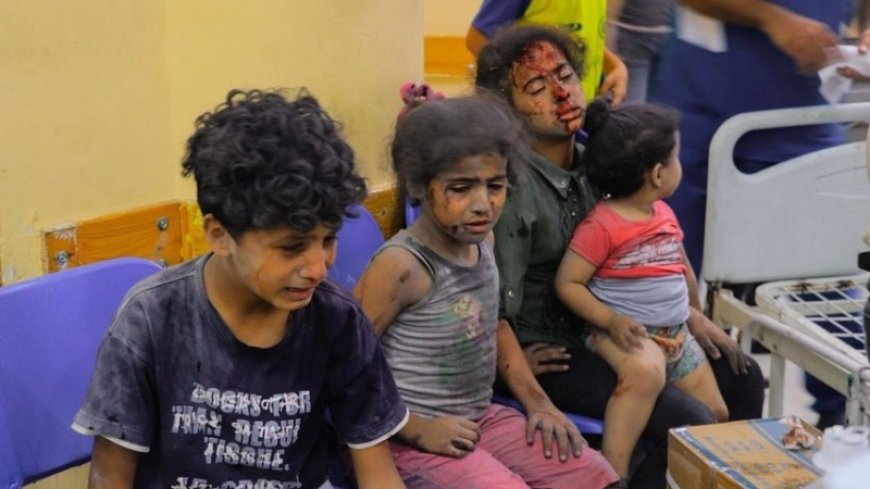Failing to Achieve Its Goals, Israel Readies for a Ceasefire
Operation Storm al-Aqsa has been going on for 76 days. The Israeli Zionist regime is trying to make up for its defeat in this operation by launching indiscriminate attacks on various areas in the Gaza Strip.

The latest attack in southern Gaza, which targeted a house belonging to Hamdan in the Khan Yunis refugee camp on Wednesday (20/12/2023) has led to the martyrdom of 14 Palestinians. The Zionist regime's military air attacks on residential housing and health centers in Gaza have not stopped for hours. United Nations Children's Fund UNICEF spokesperson James Elder said that this war is a war on children. "According to the Ministry of Health's announcement, the number of victims reached 19,000 people, and 40% of them were children," said Elder. The large number of children who died is a factor that causes UNICEF to call this war a war on children, and if this war continues for a few more days or weeks, we will see Palestinian children die due to war or illness. A ceasefire is the only thing that can prevent death from disease or starvation caused by prolonged war.
According to the Palestinian Authority's information office in Gaza, the number of martyrs in Gaza has exceeded 20,000 since the start of the Israeli military offensive on October 7 2023. Of this number, 8,000 of them are children and 6,200 are women. So far, more than 52,600 people have been injured. Israeli Zionist regime air attack on the Gaza Strip, December 2023 The worsening humanitarian situation in Gaza and the failure of the Zionist military to achieve its aggressive goals as well as the increasing loss of life have become the basis for a new ceasefire and the resumption of negotiations. In this regard, several news sources announced the visit of Ismail Haniyeh, Head of the Hamas Political Bureau, to Cairo on Wednesday. Hebrew-language media published uncertain news regarding the progress of negotiations between Hamas and Israel. According to the Haaretz newspaper , as a delegation of Hamas officials traveled to Cairo for the first time after the resumption of the war, Egypt and Qatar had announced that the possibility of opening the issue of a prisoner exchange in the short term was very weak. Meanwhile, the Yedioth Ahronoth newspaper reported that Israel is currently trying to apply its three principles in negotiations, namely conducting negotiations while continuing the war along with a temporary ceasefire, resuming negotiations from the point where negotiations stopped in the previous round, and third, identifying certain groups of the prisoners to negotiate and release them.
As reported by Sputnik , President of the Israeli Zionist regime Isaac Herzog said on Tuesday that Israel was ready to carry out a ceasefire in Gaza for the release of the remaining prisoners. The Walla website , citing Israeli officials and foreign sources, reported that Israeli officials had informed Qatari mediators of their readiness for a week-long ceasefire. The Zionist regime stated that it would pay a heavy price for the release of prisoners in the hands of Hamas. This statement certainly recalls the promise of Tel Aviv officials who claimed to free them completely and unconditionally through a military attack. However, it turns out that the military attack on Gaza did not produce any results for Israel. Meanwhile, Hamas officials have repeatedly stated that they will not negotiate a prisoner exchange agreement before a permanent ceasefire is in place, and the war ends. On the other hand, consultations at the UN Security Council which were carried out to establish a ceasefire, and prevent the United States (US) from using its veto rights, have continued and are ongoing. However, the vote on the ceasefire resolution in Gaza, which was supposed to take place on Tuesday evening local time at the UN Security Council, has been postponed.
Wide-ranging consultations are being held by various countries to prevent the US from vetoing future resolutions. Previously, the US, as a permanent member of the UN Security Council, vetoed a resolution proposed by the United Arab Emirates, which was based on a request to UN Secretary General Antonio Guterres, to establish a ceasefire in Gaza. Even though this resolution received 13 votes in favor, 1 vote against, namely the US, and one abstention from the UK. Therefore, with the refusal of the US as a permanent member of the PPB Security Council, the resolution was vetoed. This US veto caused a global reaction and rejection of the actions of the Joe Biden administration. US opposition to the ceasefire resolution caused resistance groups in the region to take action against America and Israel. If these conditions continue, the scope of war will go beyond national borders and even reach regional dimensions. A regional scale war would endanger the shipping security of the Zionist regime, and hit the economy of this illegal regime. Seeing the bad potential that will happen, the US will certainly think again if it wants to veto the new draft resolution to establish a ceasefire in Gaza. Therefore, it is likely that this ceasefire will materialize. (RA)













































